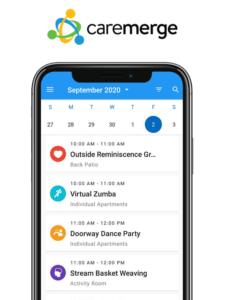Rehab services: Staff or contractor?
The demands facing long-term care (LTC) communities are ever-evolving, with constantly changing regulations and standards, shifting insurance regulations and endless staffing demands. So when an opportunity arises to partner with someone who is willing and able to carry a portion of that load, would most LTC administrators jump at the chance?
Jeff Pickering, senior vice president of business development at RehabCare, hopes the answer is yes. RehabCare provides rehabilitation and therapy services at more than 1,800 LTC locations throughout the United States. As a third-party provider, the company has experienced growth in recent years from LTC providers that see a benefit in offering strong therapy services but want a partner that can offer ready-made branding, expertise and staffing as well as assume many of the risks that come with offering such services.
“Some of the main reasons we find communities hire us are for our expertise in providing quality [resident] care; attracting and hiring qualified, licensed therapists; proprietary systems that track [resource utilization groups]; and supporting services that we bring at no charge to the client,” Pickering says.
PROS AND CONS
Nonetheless, deciding how therapy services should be offered at a community is no small decision, and not every community decides to contract for such services. Outsourcing has downsides–such as relinquishment of control and a potential loss of profit–that communities must weigh against the benefits.
“The biggest disadvantage of outsourcing therapy services is the tendency by some to forget that you own the process,” says George Katz, vice president of vendor relations at Windsor Healthcare Communities. “Some would be under the impression that, if they outsourced it, it is not their responsibility.”
Windsor provides sub-acute and nursing care at nine homes in New Jersey and works with multiple third-party therapy providers. Katz says it is in Windsor’s best interest to partner with an outside rehab and therapy company; doing so helps Windsor cost-effectively achieve the type of management it wants for its therapy services. Windsor has had to work hard to ensure that the quality and service offered is at the highest level, however, he adds.
“A couple of years back, the bulk of our communities used the same provider, but we started to feel as if the provider was slipping, so we made a move to awaken them. They were having staffing issues, and their management was not up to par, so we moved to another provider of service and took the facility away from them,” Katz says. “It worked. We saw a complete turnaround from them, and now they are in the running to earn those facilities they currently do not contract with us back into their portfolio.”
SIZE MAY MATTER
Industry trends show that larger operators of LTC communities tend to hire in-house staff to run their own rehab and therapy services. Some say that because of their size, larger providers can absorb the costs associated with the services. Smaller or private providers, however, tend to outsource the job because of the volume of residents required to justify the cost of in-house therapists. Small communities can’t always staff to census, whereas large operators–much like third-party providers–can shift staff among communities as numbers fluctuate.
Nashville, Tenn.-based Brookdale–the nation’s largest owner and operator of LTC communities–places the choice of rehab and therapy service care in the hands of its customers. Residents at Brookdale’s 640 communities decide whether to use an in-house therapist or outside services. This empowerment, Brookdale believes, is key to its continued growth.
“We work with seniors on an individual basis to assess their unique needs and then to provide customized solutions, which can include long- or short-term care,” says Kristin Puckett, a Brookdale spokesperson. “This aspect of the company has grown over the years, and we believe that this will continue, as people 65 and over are expected to represent 20 percent of the population by 2030.”
WHAT TO CONSIDER
Whether to outsource rehab and therapy services is a big decision, but those who have made the shift say communities should consider several factors when shopping for a provider:
- Total transparency. The license belongs to the community in which a third-party provider operates, so total transparency in terms of productivity, staffing levels and visits is vital. Such transparency allows a community to know how a contractor is providing services and whether services are being provided at the expected level.
- Adaptability. A therapy provider must be fluid, flexible and able to evolve with the industry. Insurance coverage has changed recently. Group therapy and concurrent therapy, for instance, no longer are allowed.
- Strong branding. Every day, someone in need of rehabilitation is being discharged from a hospital. A community that offers rehab services with a name that is easily recognizable and trustworthy is going to stand out. A skilled nursing facility needs to know that the third-party provider it chooses will help attract the people it needs.
Julie Thompson is a freelance writer based in Dayton, Ohio.
Related article: Therapy cap insanity on Capitol Hill
I Advance Senior Care is the industry-leading source for practical, in-depth, business-building, and resident care information for owners, executives, administrators, and directors of nursing at assisted living communities, skilled nursing facilities, post-acute facilities, and continuing care retirement communities. The I Advance Senior Care editorial team and industry experts provide market analysis, strategic direction, policy commentary, clinical best-practices, business management, and technology breakthroughs.
I Advance Senior Care is part of the Institute for the Advancement of Senior Care and published by Plain-English Health Care.
Related Articles
Topics: Articles , Executive Leadership , Rehabilitation











